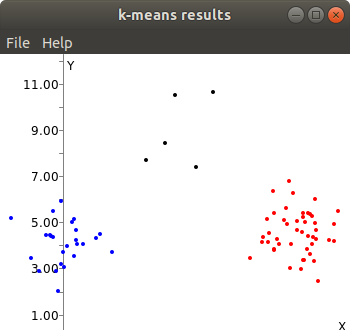Example: math_kmeans_example

C++ example source code:
/* +------------------------------------------------------------------------+ | Mobile Robot Programming Toolkit (MRPT) | | https://www.mrpt.org/ | | | | Copyright (c) 2005-2022, Individual contributors, see AUTHORS file | | See: https://www.mrpt.org/Authors - All rights reserved. | | Released under BSD License. See: https://www.mrpt.org/License | +------------------------------------------------------------------------+ */ #include <mrpt/gui/CDisplayWindowPlots.h> #include <mrpt/math/CVectorFixed.h> #include <mrpt/math/TPoint2D.h> #include <mrpt/math/kmeans.h> #include <mrpt/random.h> #include <mrpt/system/CTicTac.h> #include <iostream> #include <vector> using namespace mrpt::math; using namespace mrpt::gui; using namespace mrpt::random; using namespace mrpt::system; using namespace std; // ------------------------------------------------------ // TestKMeans // ------------------------------------------------------ void TestKMeans() { typedef CVectorFixedDouble<2> CPointType; // typedef CVectorFixedFloat<2> CPointType; getRandomGenerator().randomize(); CTicTac tictac; CDisplayWindowPlots win("k-means results"); cout << "Close the window to end.\n"; while (win.isOpen()) { // Generate N clusters of random points: std::vector<CPointType> points; const size_t nClusters = 2 + (getRandomGenerator().drawUniform32bit() % 4); for (size_t cl = 0; cl < nClusters; cl++) { const size_t nPts = getRandomGenerator().drawUniform<size_t>(5, 50); TPoint2D clCenter; clCenter.x = getRandomGenerator().drawUniform(0, 10); clCenter.y = getRandomGenerator().drawUniform(0, 10); for (size_t p = 0; p < nPts; p++) { CPointType v; v[0] = clCenter.x + getRandomGenerator().drawGaussian1D(0, 1); v[1] = clCenter.y + getRandomGenerator().drawGaussian1D(0, 1); points.push_back(v); } } // do k-means std::vector<CPointType> centers; vector<int> assignments; tictac.Tic(); const double cost = mrpt::math::kmeanspp(nClusters, points, assignments, ¢ers); cout << "Took: " << tictac.Tac() * 1e3 << " ms.\n"; cout << "cost: " << cost << endl; // Show: win.clf(); win.hold_on(); static const char colors[6] = {'b', 'r', 'k', 'g', 'm', 'c'}; for (size_t c = 0; c < nClusters; c++) { CVectorDouble xs, ys; for (size_t i = 0; i < points.size(); i++) { if (size_t(assignments[i]) == c) { xs.push_back(points[i][0]); ys.push_back(points[i][1]); } } win.plot(xs, ys, mrpt::format(".4%c", colors[c % 6])); } win.axis_fit(); win.axis_equal(); cout << "Press any key to generate another random dataset...\n"; win.waitForKey(); }; } int main(int argc, char** argv) { try { TestKMeans(); return 0; } catch (const std::exception& e) { std::cerr << "MRPT error: " << mrpt::exception_to_str(e) << std::endl; return -1; } catch (...) { printf("Another exception!!"); return -1; } }